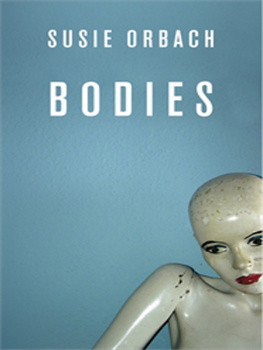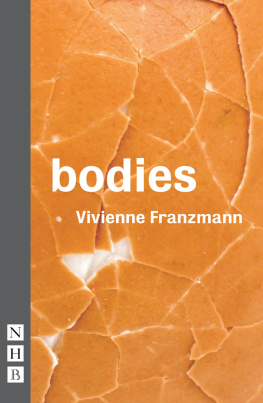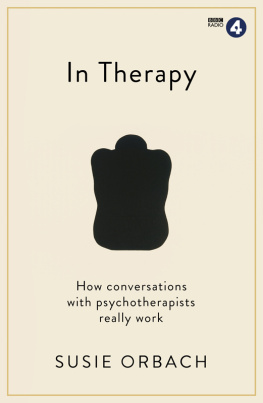Orbach - Bodies
Here you can read online Orbach - Bodies full text of the book (entire story) in english for free. Download pdf and epub, get meaning, cover and reviews about this ebook. year: 2009, publisher: Profile Books, genre: Home and family. Description of the work, (preface) as well as reviews are available. Best literature library LitArk.com created for fans of good reading and offers a wide selection of genres:
Romance novel
Science fiction
Adventure
Detective
Science
History
Home and family
Prose
Art
Politics
Computer
Non-fiction
Religion
Business
Children
Humor
Choose a favorite category and find really read worthwhile books. Enjoy immersion in the world of imagination, feel the emotions of the characters or learn something new for yourself, make an fascinating discovery.
- Book:Bodies
- Author:
- Publisher:Profile Books
- Genre:
- Year:2009
- Rating:5 / 5
- Favourites:Add to favourites
- Your mark:
- 100
- 1
- 2
- 3
- 4
- 5
Bodies: summary, description and annotation
We offer to read an annotation, description, summary or preface (depends on what the author of the book "Bodies" wrote himself). If you haven't found the necessary information about the book — write in the comments, we will try to find it.
Orbach: author's other books
Who wrote Bodies? Find out the surname, the name of the author of the book and a list of all author's works by series.
Bodies — read online for free the complete book (whole text) full work
Below is the text of the book, divided by pages. System saving the place of the last page read, allows you to conveniently read the book "Bodies" online for free, without having to search again every time where you left off. Put a bookmark, and you can go to the page where you finished reading at any time.
Font size:
Interval:
Bookmark:
BODIES
BIG IDEAS
General editor: Lisa Appignanesi
As the twenty-first century moves through its tumultuous first decade, we need to think about our world afresh. Its time to revisit not only politics, but our passions and preoccupations, and our ways of seeing the world. The Big Ideas series challenges people who think about these subjects to think in public, where soundbites and polemics too often provide sound and fury but little light. These books stir debate and will continue to be important reading for years to come.
Other titles in the series include:
Julian Baggini Complaint
Jenny Diski The Sixties
Paul Ginsborg Democracy
Ian Hacking Identity
Eva Hoffman Critical Time
Steven Lukes Moral Relativism
Renata Salecl Tyranny of Choice
Slavoj iek Violence
BODIES
Susie Orbach

First published in Great Britain in 2009 by
PROFILE BOOKS LTD
3A Exmouth House
Pine Street
London EC1R OJH
www.profilebooks.com
This eBook edition first published in 2010
Copyright Susie Orbach, 2009, 2010
The moral right of the author has been asserted.
Typeset in Minion by MacGuru Ltd
This eBook is copyright material and must not be copied, reproduced,transferred, distributed, leased, licensed or publicly performed orused in any way except as specifically permitted in writing by thepublishers, as allowed under the terms and conditions under whichit was purchased or as strictly permitted by applicable copyrightlaw. Any unauthorised distribution or use of this text may be adirect infringement of the authors and publishers rights and thoseresponsible may be liable in law accordingly.
A CIP catalogue record for this book is available from the
British Library.
eISBN 978-1-84765-126-6
CONTENTS
To Lukas, Lianna, Lilli,
Judah, Lahn and Lila
Every day my inbox, like most peoples, fills with invitations to enlarge the size of my penis or my breasts, to purchase the pleasure and potency booster Viagra and to try the latest herbal or pharmaceutical preparation to lose weight. The exhortations have fooled the spam filter and the popular science pages, which too sing of implants and pills to augment body or brain and new methods of reproduction which bypass conventional biology. Meanwhile little girls can go on the Miss Bimbo website to create a virtual doll, keep it waif thin with diet pills and buy it breast implants and facelifts. They are being primed to be teenagers who will dream of new thighs, noses or breasts as they peruse magazines which display page after page of a look that only ten years ago had the power to evoke horror in us as we recoiled at skeletal models reminiscent of famine victims. Simultaneously, government pronouncements grimly warn of an epidemic of obesity. Your body, all these phenomena shout, is your canvas to be fixed, remade and enhanced. Join in. Enjoy. Be part of it.
As a practising psychotherapist and psychoanalyst, I see the impact of calls for bodily transformations, enhancements and perfectibility in the consulting room. People do not necessarily come in with particular body troubles, but whatever their other emotional predicaments and conflicts, concern for the body is nearly always folded into them, as though it were perfectly commonplace to be telling a story in which body dissatisfaction is central. Like many of us, the people I work with wish to and do reshape their bodies in both small and dramatic ways. They find fault with their bodies and say it makes them feel better, more in control, to improve them. Like most of us, they do not like to believe that they are being unduly influenced by outside pressures and may disdain such an idea, with its crude sense of manipulation. Whether followers of fashion or health trends or not, we take for granted that looking good for ourselves will make us feel good. And yet there is a subtle tracery of outside urgings which works on us, creating a new and often dissatisfied relationship with our bodies.
The sense that biology need no longer be destiny is gaining ground and so it follows that where there is a (perceived) body problem, a body solution can be found. A belief in both the perfectible body and the notion that we should relish or at least accede to improving our own body has not, however, solved the problem. On the contrary, it has exaggerated the problem and contributed to what we observe today a progressively unstable body, a body which to an alarming degree is becoming a site of serious suffering and disorder.
Our bodies are increasingly being experienced as objects to be honed and worked on. Men are targeted with steroids, sexual aids and specific masculine-oriented diet products. Childrens bodies, too. Photographers now offer digitally enhanced baby and child photos correcting smiles, putting in or removing gaps between the teeth, straightening out wobbly knees, turning little girls into facsimiles of china dolls. The web addresses of these conjurors show no sense of irony (see, for example, www.naturalbeauties.homestead.com), since they believe that enhancing photos is a version of natural beauty, the real thing. Girlie-sexy culture now entrances more rather than fewer of us. Putting the body on show and making it appear attractive are presented as fun, desirable and easily accessible. Body beautiful and the goal of perfectibility have been democratised. Invitingly set out as available to everyone in any country whatever their economic situation, the right body is trumpeted as a way of belonging in our world today. This democratic call for beauty, disconcertingly, wears an increasingly homogenised and homogenising form, with the images and names of the global style icons pressed on the lips and the eyes of the young and the not so young. While some people may be able to opt in and do so joyfully, a larger number cannot. For the democratic idea has not extended to aesthetic variation; instead the aesthetic has paradoxically become narrower over the last few decades. The slim aesthetic with pecs for men and ample breasts for women bedevils those who dont conform, and even those who do happen to fit can carry a sorrowful insecurity about their own bodies.
A constant fretfulness and vigilance take hold for many from the moment they wake until the time they fall asleep. Their bodies are on high alert. The norm has become to worry. In another time, we would have called such anxieties an illness and, seeing how many suffer, we would have called it an epidemic. But we dont. We have become so implicated in variants of body preoccupation ourselves, and girls and women in particular so colonised by it, that the preoccupation has become second nature almost natural and invisible.
If, however, we do look, we see that the preoccupation with the body is disturbing in its capacity to affect almost an entire life, from childhood through to old age. Young boys yearnings to emulate a great sportsmans agility are now focused on the desire for the look of a six-pack. Girls as young as four have been made bodily self-conscious and are striking sexy poses in their mirrors which are more chilling than charming, while greater numbers of women in old age homes are showing signs of long-term eating disorders. Few would say that such concerns come only from outside pressures. We experience the wish for more perfect bodies as our own desire, as indeed it is, yet it is hard to separate out the ways bodies are seen, talked about and written about and the effect of that on our personal perception of our own bodies and other bodies. The body has become a new focus in both womens and mens lives, no longer something secure or ordinary in itself. A new rhetoric of detox, weight training, brushing, irrigation, cleansing is proposed, inclining us to watchfulness and determination where our body is concerned. Those who had previously paid little heed to fashion or health now find themselves caught up in attempts to make the best of themselves and to take responsibility for their health and well-being. The individual is now deemed accountable for his or her body and judged by it. Looking after oneself is a moral value. The body is becoming akin to a worthy personal project.
Font size:
Interval:
Bookmark:
Similar books «Bodies»
Look at similar books to Bodies. We have selected literature similar in name and meaning in the hope of providing readers with more options to find new, interesting, not yet read works.
Discussion, reviews of the book Bodies and just readers' own opinions. Leave your comments, write what you think about the work, its meaning or the main characters. Specify what exactly you liked and what you didn't like, and why you think so.








